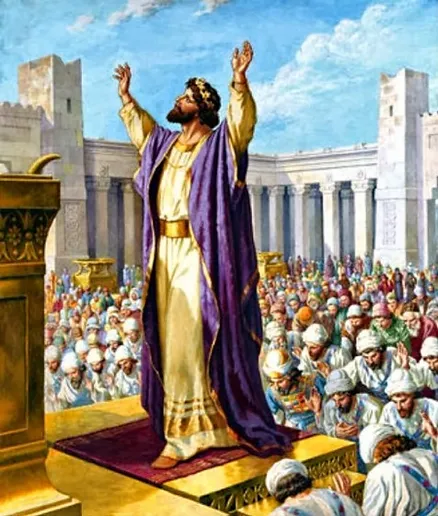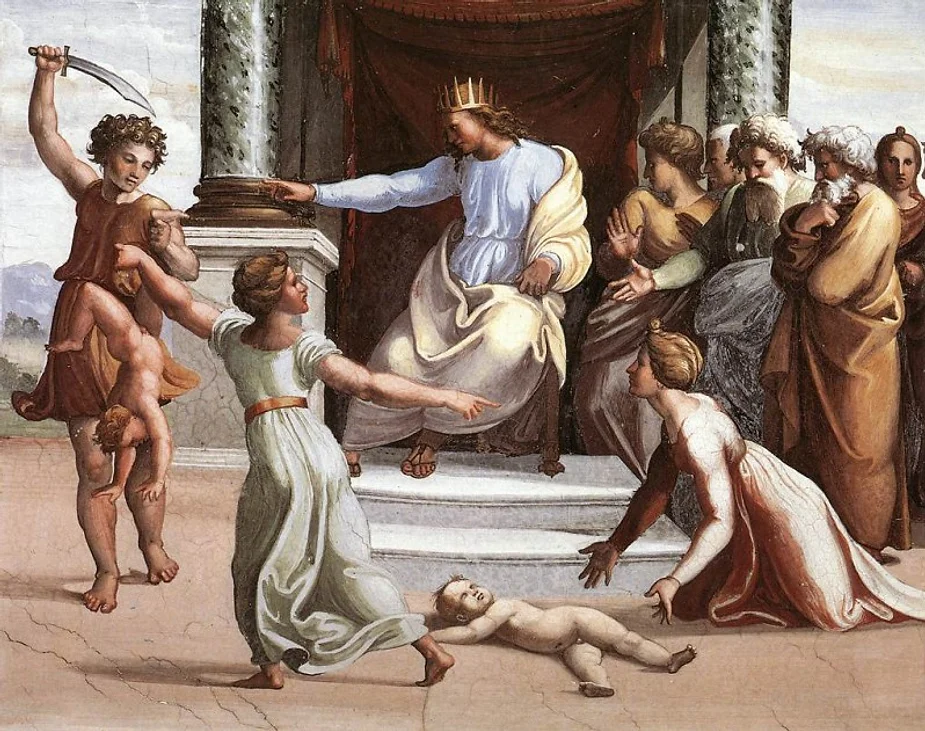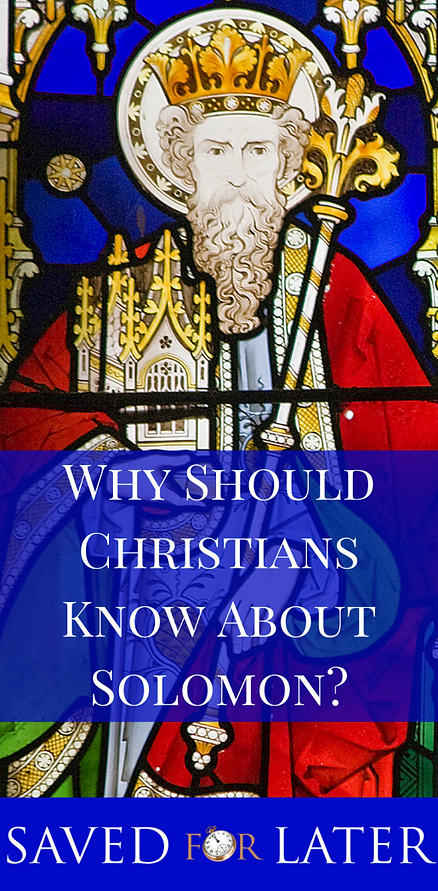We learn of Solomon’s life in the Old Testament books of 1 Kings and 2 Chronicles. We learn of Solomon’s great wisdom as well in the books he has written; Song of Songs, Ecclesiastes, and Proverbs.

I didn’t adequately include Solomon’s life in my Bible Heroes post some weeks back. This week’s post is partially to make up for that fact.
Solomon’s father, David, declared his 12-year-old son king just before dying. One of Solomon’s first acts as the young king was to sacrifice a thousand burnt offerings on the altar for God. Solomon loved the Lord (I Kings 3:3).
Solomon commissioned the construction of God’s temple, which took 7 years to complete. Solomon then dedicated the Temple to the Lord.
Solomon remained king over Israel for 40 years until his death. Those 40 years were the best in Israel’s history, full of peace and prosperity.
The power of proper prayer.
Solomon frequently sought after God. One night, God appeared to Solomon and basically asked him, what would you like?
Can you imagine being asked that question by God? Pick something, anything, name it. Tell Me… what would you like? Do we go to God with that kind of assurance in prayer? I believe He wants us to.
What would you have asked for in that situation? Money, I mean real money? True wealth? Popularity? The death of your greatest enemies? Long life? Power? How about a superpower? Invisibility? Flight? C’mon… he was 12.
Anyway, here’s what Solomon did ask God for:
Give me now wisdom and knowledge to go out and come in before this people, for who can govern this people of yours, which is so great? (2 Chronicles 1:10)
The reassurance of God’s gifts.
Because this was in your heart, and you have not asked for possessions, wealth, honor, or the life of those who hate you, and have not even asked for long life, but have asked for wisdom and knowledge for yourself that you may govern my people over whom I have made you king, wisdom and knowledge are granted to you. I will also give you riches, possessions, and honor, such as none of the kings had who were before you, and none after you shall have the like. (2 Chronicles 1:11-12)
God basically said, because you asked Me for the greatest thing you could have asked Me for, I’m giving you that… and everything else. Talk about being in God’s will.
God gave Solomon what he asked for. He made him the wisest man who ever lived (except for Jesus of course, but He is also God).
Then He gave Solomon everything else. It’s been said that King Solomon was the wealthiest man who ever lived. Solomon’s riches in gold, silver, jewels, bronze, spices, grain, livestock, and oil were beyond measure.
The effect of these great gifts cannot be overstated, though it is often overlooked. With this pairing of vast riches and vast wisdom, God produced one of the most valuable examples in the Bible.
The Wisdom of King Solomon.
The two prostitutes were roommates, and each had a baby. One of the babies died, but both mothers claimed that the living baby was hers.
Ever heard the term split the baby? That was Solomon’s solution. He ordered that the baby be split into two halves and a half given to each mother.
When one of the mothers was satisfied with his solution, and the other was horrified, Solomon quickly knew who the real mother was. From that time on, Israel knew of Solomon’s great wisdom (1 Kings 3:16-28).

And God gave Solomon wisdom and understanding beyond measure, and breadth of mind like the sand on the seashore. (1 Kings 4:29)
He wrote the Song of Songs, which is a poetic discussion of physical love between a married couple.
Though these two works would have been enough to give value to anyone’s time on earth, it is the book of Ecclesiastes that gives us the true value of Solomon’s life, and the meaning of life for us all.
The true meaning of life.

It’s as if God said, I’m going to pick one person, and I am going to give him every earthly good, all the material wealth a man can know, and I’m going to make that same person the wisest who ever lived. Then I want that person to report back to Me on what he learned. That is the book of Ecclesiastes.
So Solomon knew every exotic pleasure available. If it could be had, Solomon had it. He had 700 wives and 300 concubines. There was nothing that could be owned that Solomon did not own.
- There was no experience known at the time that he did not experience (Ecclesiastes 2:10)
- Solomon tried everything (Ecclesiastes 2:1, 3).
- He lived extravagantly (Ecclesiastes 2:4-9).
- Everything that this world has to offer is vanity (Ecclesiastes 1:2, 12:8).
- There is a proper time for everything (Ecclesiastes 3:1).
- Pleasures are meaningless (Ecclesiastes 2:1).
- There is nothing new under the sun (Ecclesiastes 1:9).
- Wisdom is better than folly (Ecclesiastes 2:13).
- All that we do, eat, drink, or enjoy is from the hand of God (Ecclesiastes 2:24-25).
- Wealth is meaningless, and whoever loves wealth will never have enough (Ecclesiastes 5:10).
- Everything to come is also vanity (Ecclesiastes 11:8).
The end of the matter; all has been heard. Fear God and keep his commandments, for this is the whole duty of man. For God will bring every deed into judgment, with every secret thing, whether good or evil. (Ecclesiastes 12:13-14)
The prophet Nehemiah would write of Solomon’s sin despite his accomplishments as king and despite God’s love for him (Nehemiah 13:26).
Perhaps this can be the most encouraging aspect of Solomon’s life. Despite his human failures, God loved Solomon.
God was able to still use Solomon to write some of the richest biblical wisdom we have access to.
Maybe God could even use someone like you or me, despite our failures.
Let’s pray.
Scripture quotations are from the ESV® Bible (The Holy Bible, English Standard Version®), copyright © 2001 by Crossway, a publishing ministry of Good News Publishers. Used by permission. All rights reserved.

